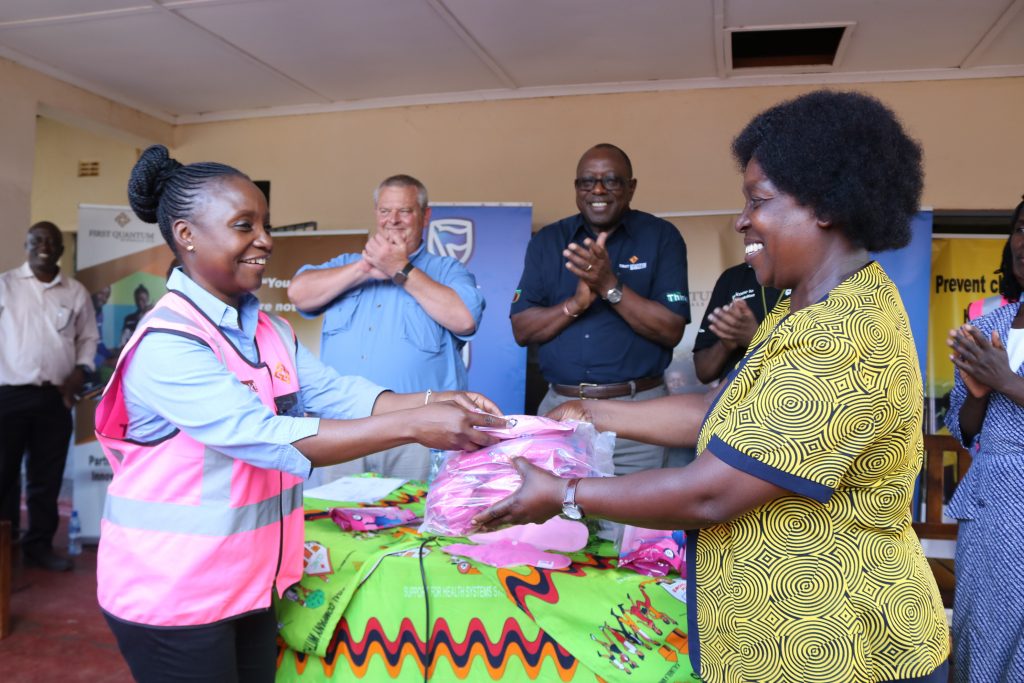It is amazing to see banking and mining leaders partner to support an area of society that is immensely neglected – the girl child education and women’s health. After all women are factors of production which are represented by labour in the economic productivity equation. An educated and healthy labour force translates to a quality factor of production. Zambia’s largest bank by asset size, Stanbic and one of the nations top miners First Quantum Minerals (FQM) have partnered to support the Kansanshi Foundation’s Jimuka (‘Be Clever’) programme. This will accord the girls practical help required for them to stay in school.
The blue bank this week donated 500 reusable feminine hygiene products to pupils at Kikombe School in Solwezi, in the Copperbelt of Africa.
The Jimuka programme, was set up by FQM in January of 2018, where girls are counselled on the benefits of getting an education, women’s health, the importance of hygiene, the dangers of early marriage and teenage pregnancy alongside distribution of launder-able feminine hygiene products.
The pupils also get a chance to be mentored by career women who act as their role models under the programme, through which FQM has distributed sanitary wear to girls in 22 schools within Solwezi. The target is to cover 28 schools which the mine supports under the KanEQuIP programme, reaching approximately 2,000 female pupils.
Speaking during the handover ceremony in Solwezi, Stanbic Bank Executive Director of Corporate and Investment Banking Ms. Helen Lubamba said Stanbic Bank was an avid advocate for women’s health and girls’ education.
“Stanbic Bank has always been a passionate advocate for women’s health and girl’s education both of which represent some of the core pillars embedded in our community sustainability model,” she said.
“The future of our society is in the hands of our children, who are the future leaders. It is the responsibility of government, the private sector and other stakeholders to take a proactive stance in ensuring that our children are educated in healthier and sanitary conditions.”
Kansanshi Mining PR Manager Godfrey Msiska thanked Stanbic for its partnership and said FQM realizes that when mining operations at end, the communities should be able to sustain themselves, beyond the life of mine.
We as FQM are working towards achieving the goal that these communities are left in a much better economic condition, in better health and, more importantly, with solid education firmly tucked under their belts. Education; no one can take that away from them. With a solid education, they can achieve anything, Mr. Msiska said
In recent years, Zambia has made significant progress in promoting girl’s education with more girls getting equal access to school. However, girl’s education is still heavily impacted by traditional practices and high poverty levels that hinder girls from completing their schooling.
Each year, thousands of girls across the country are forced to drop out of school as they are coerced to marry at a very young age, while those that escape this vice are likely to miss class because they cannot afford to buy sanitary wear, affecting their performance.
The inconsistent class attendance from girls, especially those in rural areas, threatens the pupils’ ability to graduate from school and build a career of their own –trapping them and their family in a never-ending cycle of poverty.
Stanbic Bank Director of Corporate and Investment Banking noted
“Our goal is to ensure girls stay in school and get an education and eventually contribute meaningfully to Zambia’s economy. We are confident the reusable hygiene products will go a long way in achieving this,” said Ms Lubamba.
She added that Stanbic Bank supported calls for feminine hygiene products to be provided for free to school-going girls to minimise the high levels of preventable absenteeism among female pupils.
“One of the main pillars in our business strategy is making a positive difference in people’s lives. And because Zambia is our home, we will continue to drive her growth by investing in people, especially the youth, who make up over half the country’s population,” she said.
“We are glad to see that FQM shares the same values of girls’ education and health that Stanbic Bank has, through its various rural community development and youth education programmes.”
“At Stanbic we value, the mine’s practical approach to developing future leaders by promoting good health and access to good quality education. It’s for this reason that we feel our partnership with FQM-Kansanshi mine will last for many years to come as partnerships based on shared values often do.”

